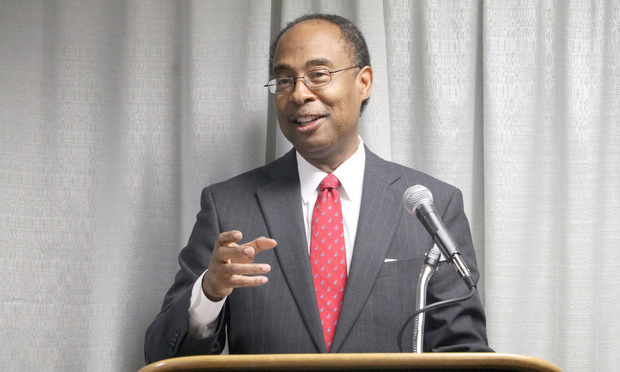Judge in Georgia Abortion Fight Known for His Fair-Minded Demeanor
U.S. District Judge Steve Jones, an Obama appointee, drew high praise during his investiture from Justice Clarence Thomas.
July 12, 2019 at 02:43 PM
7 minute read
 U.S. Distrist Court Judge Steve Jones.
U.S. Distrist Court Judge Steve Jones.
The legal challenge to a new Georgia law intended to dramatically limit abortions in the state has been assigned to a federal judge in Atlanta with nearly 24 years of experience on the bench.
U.S. District Judge Steve Jones—whose 2011 appointment to the federal bench marked a consensus between President Barack Obama's administration and Georgia Republican Sens. Johnny Isakson and Saxby Chambliss—will preside over a lawsuit challenging Georgia's “fetal heartbeat” law.
Signed by Gov. Brian Kemp on May 6 to fulfill a campaign promise, Georgia's new abortion law, which won't take effect until next year, is one of the most restrictive in the nation. Like similar laws passed this year in Alabama and six other mostly Southern states, Georgia's law is intended, in part, as a potential challenge to the U.S. Supreme Court's two 46-year-old landmark rulings, Roe v. Wade and Doe v. Bolton, that legalized abortion.
Last month, attorneys with the ACLU of Georgia, the Planned Parenthood Federation of America and other national reproductive rights groups sued Kemp, Georgia Attorney General Chris Carr, members of Georgia's Composite Medical Board that disciplines and licenses physicians and multiple district attorneys in a constitutional challenge that claims the law would criminalize abortion “from the earliest stages of pregnancy.” The suit was filed on behalf of several reproductive rights organizations, multiple women's health care facilities that perform abortions and several physicians.
Jones first became a judge in 1992 after accepting an appointment to the municipal court in Athens, Georgia, where he was born and raised. Three years later, Gov. Zell Miller, a Democrat, appointed Jones to an unexpired term on the Western Circuit's Superior Court bench. He was reelected four times without opposition.
Jones' 2011 appointment to the federal bench in Atlanta made him the third African American judge appointed to the Northern District. He was originally passed over for a post in the Middle District of Georgia before he was recommended for the Atlanta post.
The most recent lawsuit is not Jones' first brush with Georgia's fetal heartbeat law. In March, the ACLU sued the state Capitol Police Department and the Georgia Department of Public Safety on behalf of reproductive rights protesters who were wearing buttons opposing the heartbeat bill that included an obscenity. The protesters were ordered by police to remove the buttons.
Forty-eight hours later, Jones issued a temporary restraining order rescinding the button ban, which he described as “a total restriction” of free speech.
Jones is also presiding over another nationally watched case—a sweeping challenge to Georgia's election system brought by a nonprofit organization founded and chaired by former state House Minority Leader Stacey Abrams.
Abrams, a Democrat, founded Fair Fight Action after she lost the 2018 gubernatorial race to Kemp, then secretary of state and Georgia's chief election officer. Abrams has claimed her loss rested on significant voter suppression efforts by Kemp. The suit asks Jones to reinstitute preclearance, conducted for nearly 50 years by the U.S. Justice Department, before Georgia officials may undertake virtually any action that would impact voting.
In May, Jones denied a motion by the current Secretary of State Brad Raffensperger to dismiss the case.
Jones is also presiding over multiple criminal prosecutions brought by U.S. Attorney Byung J. “BJay” Pak in an ongoing public corruption investigation at Atlanta City Hall. The investigation, which began during the term of former Atlanta Mayor Kasim Reed, has resulted in five guilty pleas so far. Two more criminal cases are pending before Jones.
Jones has been described as “understated,” “very conscientious,” and “extremely fair-minded” by those who recommended him to Georgia's senators and the White House.
Ronald L. Carlson, a University of Georgia law professor who was a member of a separate vetting committee that Isakson and Chambliss convened, has said Jones “simply does not develop or display any measure of unseemly anger as he goes about his judicial duties. … He keeps it all under marvelous control. If we could all emulate Steve Jones' patience and tolerance, it would be a better world.”
Jones is a “Law Dawg,” who earned both his undergraduate and law degrees at the University of Georgia. Jones put himself through UGA in three years as an undergraduate, where he majored in accounting and business administration.
He was hired by then-Clark County District Attorney Harry Gordon to head the office's child support recovery unit—a post Jones held for seven years while putting himself through law school. Gordon then hired Jones as an assistant district attorney.
“I treated people with respect but forced people to support their kids,” Jones told The Daily Report in 2011. “I got people back involved in their kids' lives.” When estranged parents began supporting their children financially, he said, they began to visit them, which often led to a desire to legitimize their children who were born out of wedlock.
“I like to think there's a child out there somewhere—and maybe there's only one child—and a father who got back involved in their life, and they're better off,” he said.
At Jones' federal investiture ceremony, U.S. Supreme Court Justice Clarence Thomas presented him with his commission. Thomas said the two met when Jones was a Superior Court judge, and that they “sat a long spell” in Jones' chambers talking about growing up in Georgia, their experiences and their cases. Thomas said he later told his wife that Jones was “one of the most wonderful human beings I have ever met.”
At the investiture, one of Jones's judicial colleagues also revealed that Jones named the goats he raised on his Athens farm after Supreme Court justices, including Thomas and Justice Antonin Scalia.
Jones told the Daily Report at the time, “The judges they're named after are out of respect.”
At night, after court has adjourned and the lawyers and reporters have left for the day, Jones said he replays his rulings and his conversations in his head, he told The Daily Report after his 2011 swearing-in.
“I reflect back on the day,” he said—a cautious habit that stems from wanting to be sure he has made the right call, done or said the right thing and accomplished something productive during the day.
“It's kind of a check mark,” he said. “I started it in law school. … I really got into it when trying cases. I go back and retry a case in my mind. Some people say that, once something's done, you can't change it. I don't believe that.”
Additional Reading:
As Alabama Case Closes and Georgia Case Gets Started, Justice Thomas Tears Into Abortion Precedent
Federal Judge OKs Lawsuit Demanding Sweeping Reforms of Georgia Elections
This content has been archived. It is available through our partners, LexisNexis® and Bloomberg Law.
To view this content, please continue to their sites.
Not a Lexis Subscriber?
Subscribe Now
Not a Bloomberg Law Subscriber?
Subscribe Now
NOT FOR REPRINT
© 2025 ALM Global, LLC, All Rights Reserved. Request academic re-use from www.copyright.com. All other uses, submit a request to [email protected]. For more information visit Asset & Logo Licensing.
You Might Like
View All
Law Firms Expand Scope of Immigration Expertise Amid Blitz of Trump Orders
6 minute read
Bass Berry & Sims Relocates to Nashville Office Designed to Encourage Collaboration, Inclusion
4 minute read
Gunderson Dettmer Opens Atlanta Office With 3 Partners From Morris Manning
3 minute read
Trending Stories
- 1Uber Files RICO Suit Against Plaintiff-Side Firms Alleging Fraudulent Injury Claims
- 2The Law Firm Disrupted: Scrutinizing the Elephant More Than the Mouse
- 3Inherent Diminished Value Damages Unavailable to 3rd-Party Claimants, Court Says
- 4Pa. Defense Firm Sued by Client Over Ex-Eagles Player's $43.5M Med Mal Win
- 5Losses Mount at Morris Manning, but Departing Ex-Chair Stays Bullish About His Old Firm's Future
Who Got The Work
J. Brugh Lower of Gibbons has entered an appearance for industrial equipment supplier Devco Corporation in a pending trademark infringement lawsuit. The suit, accusing the defendant of selling knock-off Graco products, was filed Dec. 18 in New Jersey District Court by Rivkin Radler on behalf of Graco Inc. and Graco Minnesota. The case, assigned to U.S. District Judge Zahid N. Quraishi, is 3:24-cv-11294, Graco Inc. et al v. Devco Corporation.
Who Got The Work
Rebecca Maller-Stein and Kent A. Yalowitz of Arnold & Porter Kaye Scholer have entered their appearances for Hanaco Venture Capital and its executives, Lior Prosor and David Frankel, in a pending securities lawsuit. The action, filed on Dec. 24 in New York Southern District Court by Zell, Aron & Co. on behalf of Goldeneye Advisors, accuses the defendants of negligently and fraudulently managing the plaintiff's $1 million investment. The case, assigned to U.S. District Judge Vernon S. Broderick, is 1:24-cv-09918, Goldeneye Advisors, LLC v. Hanaco Venture Capital, Ltd. et al.
Who Got The Work
Attorneys from A&O Shearman has stepped in as defense counsel for Toronto-Dominion Bank and other defendants in a pending securities class action. The suit, filed Dec. 11 in New York Southern District Court by Bleichmar Fonti & Auld, accuses the defendants of concealing the bank's 'pervasive' deficiencies in regards to its compliance with the Bank Secrecy Act and the quality of its anti-money laundering controls. The case, assigned to U.S. District Judge Arun Subramanian, is 1:24-cv-09445, Gonzalez v. The Toronto-Dominion Bank et al.
Who Got The Work
Crown Castle International, a Pennsylvania company providing shared communications infrastructure, has turned to Luke D. Wolf of Gordon Rees Scully Mansukhani to fend off a pending breach-of-contract lawsuit. The court action, filed Nov. 25 in Michigan Eastern District Court by Hooper Hathaway PC on behalf of The Town Residences LLC, accuses Crown Castle of failing to transfer approximately $30,000 in utility payments from T-Mobile in breach of a roof-top lease and assignment agreement. The case, assigned to U.S. District Judge Susan K. Declercq, is 2:24-cv-13131, The Town Residences LLC v. T-Mobile US, Inc. et al.
Who Got The Work
Wilfred P. Coronato and Daniel M. Schwartz of McCarter & English have stepped in as defense counsel to Electrolux Home Products Inc. in a pending product liability lawsuit. The court action, filed Nov. 26 in New York Eastern District Court by Poulos Lopiccolo PC and Nagel Rice LLP on behalf of David Stern, alleges that the defendant's refrigerators’ drawers and shelving repeatedly break and fall apart within months after purchase. The case, assigned to U.S. District Judge Joan M. Azrack, is 2:24-cv-08204, Stern v. Electrolux Home Products, Inc.
Featured Firms
Law Offices of Gary Martin Hays & Associates, P.C.
(470) 294-1674
Law Offices of Mark E. Salomone
(857) 444-6468
Smith & Hassler
(713) 739-1250






